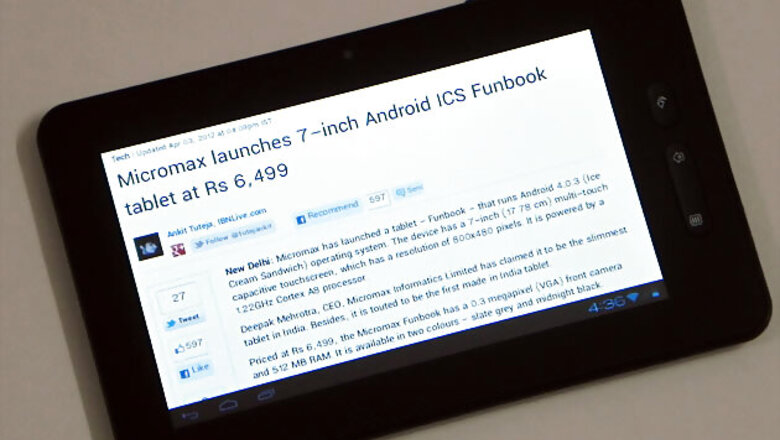
views
New Delhi: One thing is for sure, tablets are the future of education. But I am not quite certain if that tomorrow will be displayed on a 7-inch screen. 10-inch devices do seem to have an advantage. Even if they currently carry a heavier price tag, I am quite sure things will change fast. As fast as the plummeting prices of feature-rich tablet devices.
On Tuesday, when Micromax announced its awaited entry into the tablet market with the Rs 6,499 Funbook tablet (model number: P300) targeted towards the youth, the excitement and interest in the online world made it seem to be worth the wait. Two of the top 10 trends on Twitter that day was related to the tablet. I too couldn't wait to get my hands on the device and here is the first review that you will find anywhere of the Micromax Funbook tablet.
We should never be fooled by publicity images. All models, whether human or not look, attractive when properly photoshopped. Therefore I was a bit skeptical before I actually held the Micromax Funbook in my hand. The first thing that struck me was its weight, or rather the lack of it and also its comparatively slim profile.
Many of the much-hyped tablets, be it the world's cheapest Aakash tablet or the overpriced Milagrow TabTop PC, put me off at the first sight. I wouldn't want to be seen in respectable company with one of those fugly devices in my hands. The Micromax Funbook may not be the most handsome kid on the block, but it does have attractive looks. Available in two variants Slate Grey and Midnight Black, the review unit is Slate Grey. But I personally prefer Midnight Black.
There is also the recently launched HCL ME U1 tablet with comparable specs, but a Rs 1,500 higher price tag. Since I'm yet take the ME U1 for a test ride, I'll not proceed with further comparisons.
Measuring 12.2 x 19.2 centimetres the Micromax Funbook tablet is comfortable to hold with one hand for long durations, (aided by its minimal weight) unlike the Amazon Kindle Fire, which cannot be recommended for people with weak wrists.
Something that stands out like pimples on a teenager's face are the protruding home, menu and back buttons. Android Ice Cream Sandwich doesn't need these front hardware buttons and this makes me suspect that Micromax's device was not originally intended run on Android 4.0 and the software upgrade was thought of later taking note of the interest in the latest version of Google's mobile operating system. Sometimes it is a bit awkward to find two sets of buttons, one on the screen and other on the body to perform exactly the same functions. But the advantage of having the hard buttons is that they are easier to access than their tiny on-screen counterparts. But Micromax should have given adding touch buttons a thought. The tablet would've looked a lot sexier.
Android 4.0 (the Funbook runs version 4.0.3) is said to be a vast improvement over its predecessors and it is. When Android 4 is here, there's no point to go for a device with an older version of the OS and then wait for the manufacturer to release an official upgrade.
(An observation: Ice Cream Sandwich looks much better on the more compact smartphone screens than on the larger tablet displays. )
The tablet also claims to be an entertainment hub. I threw in a number of different popular formats at it, including some 1080p and it played them all smoothly. The 1.22GHz Cortex A8 processor with Dual Mali GPU seemed to be doing the job well. The sound output (via the built in speaker) is nothing to be very satisfied about and it is (as usual) advisable to invest in a good pair of headphones.
The presence of a mini-HDMI port extends the tablet to some exciting, albeit un-tablet-like possibilities. Because of its ability to play formats that the HD TV at home couldn't, I plugged the Micromax Funbook to television set and watched a few clips on a larger screen. It can also double up as a handy home media player.
The Micromax Funbook's capacitive screen will not dazzle you with its 800x480 pixel resolution. Also the viewing angles aren't that good. While the device plays 1080p videos, the lower screen resolution means that you cannot enjoy them in their full HD glory, but the video clarity makes watching HD videos more worth the while than other lower resolution videos. The touch is also quite responsive.
The presence of a mini-USB port came as a shocker. Expecting micro-USB compatibility is almost the norm for most devices nowadays since it is compliant with the Universal Charging Solution initiative. Don't know why Micromax chose to sail against the tide on this little but important point. Also having a non-standard charging socket and charger seems strange. When major manufacturers are coming together to develop standards, Micromax is breaking them with what is otherwise a more than satisfactory product.
The tablet doesn't have a rear camera and comes with a front VGA camera, that is only good for video chatting. To desire for a rear camera is asking for a bit too much at this price, at least for now.
The 2800mAh battery gives, according to Micromax, a browsing time of about 5 hours. That's not too great an achievement and something that we will have to learn to live with given that it is light on our wallets. I had been using the device intermittently (on WiFi) for this review and it ran out of juice in a little more than 4 hours.
Positioned as an education tablet, the Funbook comes preloaded with education apps. But they failed to impress. I quit the Vriti app soon after, not because I left school years ago but because it looks so unimaginative and was sluggish even on my high speed home WiFi. I wonder how Vriti (and Micromax by extension) will engage the young and demanding audience they are intending to target?
Also I have this thing against bloatware. Since it does not take a Herculean effort to install apps of the user's choice, manufacturers can at most point users to places that they think will be of the user's interest and not clog the device that she purchases with potentially unwanted software. Micromax's own app store that comes preinstalled with the device pales in comparison with Google Play or even the Amazon App Store. Also I don't get the idea of treating video files as apps.
With the Amazon Kindle App, that doesn't come preinstalled, the Micromax Funbook turns itself into a handy e-reader. Only if it had the battery to support extended reading sessions.
With tethering on my Android smartphone I no longer have the need for a separate Internet USB dongle and nor do many others. This means that I have hardly have any need for the bundled Tata DoCoMo 3G dongle. So does that translate into an even lesser price tag? Have to post this question to Micromax.
Even in this age of globalisation, we do take a lot of pride in made in India products. More so when the market is flooded with made in China stuff. The Micromax Funbook proudly flaunts its made in India tag and is said to be the first 'swadeshi' tablet. Our review device was manufactured at Simmtronics Semiconductors Limited, Roorkee, Uttarakhand.
India is a market of sasta, sundar and tikau (cheap, beautiful and durable). Very few products managed to score well on all three parametres. The Micromax Funbook tablet may not be Aakash cheap, but it is wallet friendly. It may not be a beauty queen but is pleasing to the eyes. Durability is a factor of time and usage, this is one factor that, as the cliche goes, only time can tell. But definitely paisa wasool (worth the money).
Before you rush out to grab a 7-inch Funbook for yourself, note that Micromax is expected launch a 10-inch tablet soon.
Specifications
Processor: 1.22GHz Cortex A8; Dual Mali - 400 2D/3 GPU
Operating system: Android 4.0 Ice Cream Sandwich
Display: 17.78 cm (7-inch) capacitive
Camera: Front VGA
Memory: 4GB internal; 512MB RAM; Expandable 32GB microSD
Media support: 1080p video; MPEG2/4, AVI, WMV, MOV (also supports MKV, FLV, MP3)
Sensors: Gravity, accelerometer
Battery: 2800mAh; 5 hours of browsing time
Connectivity: 3G dongle support via USB; HDMI out; WiFI 802.11 b/g; USB 2.0
Pros
+ Price
+ Looks
+ Weight
+ Power
Cons
- Protruding front buttons
- No micro USB port
- Non-standard charger
- Battery life
- Bloatware
Rating 3.5/5

















Comments
0 comment